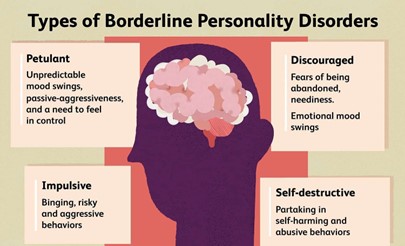What is the nurse's priority assessment for a patient with borderline personality disorder?
Suicidal or homicidal ideations
Sleep patern changes
Impulsive behaviours
Only support systems
The Correct Answer is A
Borderline personality disorder is a serious mental illness characterized by instability in mood, behaviour, and self-image. Patients with borderline personality disorder are at a high risk of self-harm, suicide, and impulsive behaviours. Therefore, the nurse's priority assessment should be to identify any suicidal or homicidal ideations, as these can be life-threatening emergencies. Once identified, appropriate interventions should be initiated, such as suicide precautions, crisis management, and referral to mental health professionals for further evaluation and treatment.
While sleep patern changes, impulsive behaviours, and support systems are also important aspects to assess in patients with borderline personality disorder, they are not the priority when compared to suicidal or homicidal ideations.

Nursing Test Bank
Naxlex Comprehensive Predictor Exams
Related Questions
Correct Answer is ["A","E"]
Explanation
a. “I can see that you feel sad about this situation”.
e. “The loss of your parent should be very painful for you.”
These responses by the nurse show empathy and validate the patient’s feelings. They also encourage the patient to continue expressing their emotions and facilitate communication.
Option b. “Don’t be sad, everyone has to pass for something like this in the life” is not a helpful response
because it minimizes the patient’s feelings and may make them feel like their emotions are not valid.
Option c. “I felt very sad when my mother died, it was horrible!” is not a helpful response because it shifts the focus of the conversation away from the patient and onto the nurse’s personal experience.
Option d. “Let’s talk about something else. this subject is upsetting you, don’t worry about this” is not a helpful response because it dismisses the patient’s emotions and may make them feel like they are not allowed to express their feelings.
Correct Answer is D
Explanation
This comment indicates the possibility of obsessive-compulsive disorder (OCD) because it describes a repetitive behavior that may be a compulsion. Compulsions are repetitive behaviors or mental acts that an individual feels driven to perform in response to an obsession or according to rules that must be applied rigidly. In this case, the individual’s compulsion may be to repeatedly check the location of their car keys in order to reduce anxiety or distress.

Whether you are a student looking to ace your exams or a practicing nurse seeking to enhance your expertise , our nursing education contents will empower you with the confidence and competence to make a difference in the lives of patients and become a respected leader in the healthcare field.
Visit Naxlex, invest in your future and unlock endless possibilities with our unparalleled nursing education contents today
Report Wrong Answer on the Current Question
Do you disagree with the answer? If yes, what is your expected answer? Explain.
Kindly be descriptive with the issue you are facing.
